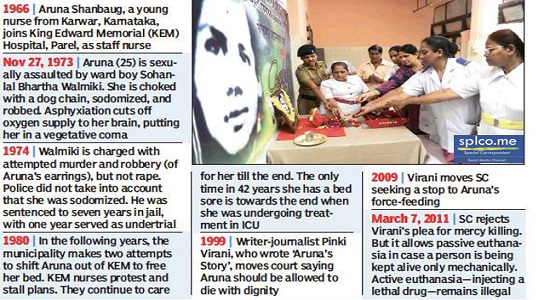A Constitution Bench, led by Chief Justice of India Dipak Misra, in three concurring opinions, upheld that the fundamental right to life and dignity includes right to refuse treatment and die with dignity.

The fundamental right to a "meaningful existence" includes a person's choice to die without suffering, it held.
Chief Justice Misra, in a common judgment with Justice A.M. Khanwilkar, said it was time to "alleviate the agony of an individual" and stand by his right to a dignified passing. A dignified death should follow a meaningful existence, the five-judge Bench agreed in a unanimous voice.
Justice A.K. Sikri, in his separate opinion, said though religion, morality, philosophy, law and society shared equally strong and conflicting opinions about whether right to life included right to death, they all agreed that a person should die with dignity.
Justice Sikri said an advance directive or living will from a patient to stop medical treatment at a particular stage "particularly when he is brain dead or clinically dead or not revivable" quelled apprehensions of future regret for relatives and criminal action against doctors.
The Chief Justice's judgment includes specific guidelines to test the validity of a living will, by whom it should be certified, when and how it should come into effect, etc. The guidelines also cover a situation where there is no living will and how to approach a plea for passive euthanasia.
In a separate opinion, Justice Chandrachud observed that modern medical science should balance its quest to prolong life with need to provide patients quality of life. One was meaningless without the other, he said.
The issue of death and when to die transcended the boundaries of law, but the court had intervened because it also concerned the liberty and autonomy of the individual, he said.
Justice Chandrachud read from his judgment that the sanctity of life included the dignity and autonomy of the individual.
"Free will includes the right of a person to refuse medical treatment," he said.
A person need not give any reasons nor is he answerable to any authority on why he should write an advanced directive.
But the judge held that active euthanasia is unlawful.
For this reason, he said the reasons given by a two-judge Bench of the Supreme Court in the Aruna Shanbaug case, allowing passive euthanasia, were "flawed" as the convoluted procedure to get a go-ahead for passive euthanasia made the dignity of a dying person dependent on the whims and will of third parties.
"To deprive a person dignity at the end of life is to deprive him of a meaningful existence," Justice Chandrachud read from his opinion he shared with Justice Ashok Bhushan.
Friday SC judgment legalising passive euthanasia and living will was welcomed by those championing the cause, but they called it just the beginning of a long journey ahead.
One of the earliest demands for dignified death originated from Mumbai in 1981 when social activist Minoo Masani formed The Society for the Right to Die with Dignity (SRDD). This group that started with a handful of persons now has over 600 members, including several non-medical persons.
Dr Surendra Dhelia, SRDD secretary, called Friday's order a great beginning. “The SC has granted autonomy to a citizen to decide what he wants and doesn't at the end of life. Doctors, patients and caretakers go through a lot of stress which is physical, emotional and financial, but there is little understanding or empathy for that,” he said. Neurologist Dr Roop Gursahani, a member of the steering committee of End-of-life-care in India Task Force (ELICIT) said the judgement is the foundation of a process for both doctors and legal professionals to understand duties and responsibilities towards patients. Importantly, he said, it was the beginning for patients to take charge of their last days.
Now, experts said, it's time to look into the details. The SC said a medical board would take a final call once a petition is in. Dr Gursahani said information about who would constitute the board, whether the state would have one or every hospital would have their own bodies, is awaited.














